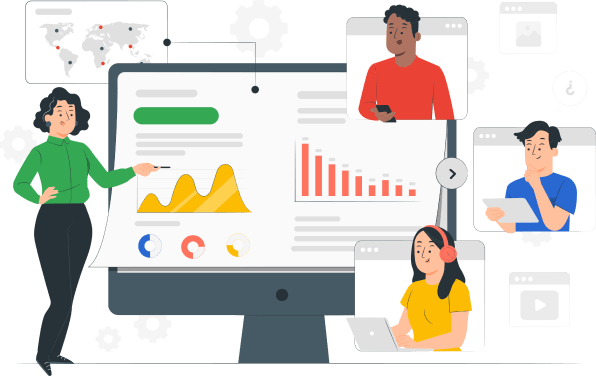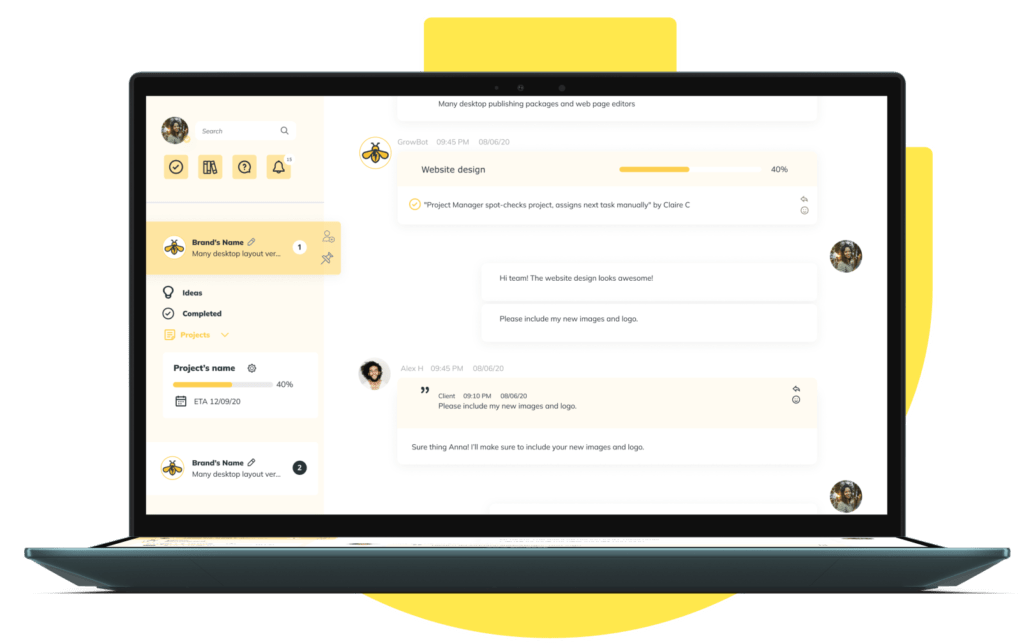|
Getting your Trinity Audio player ready...
|

The Role of AI in Modern CRM
In CRM, AI is a game-changer. It’s not just about storing customer data anymore; it’s about changing that data into actionable insights. Let’s break down how AI is reshaping CRM systems with data analysis, automation, and personalization.
Data Analysis
AI’s ability to analyze vast amounts of data quickly is unparalleled. Imagine having a tool that can sift through customer interactions, purchase histories, and even social media activity to find patterns. AI does just that, providing insights that were once impossible to gather manually.
For example, AI can identify which leads are most likely to convert by analyzing historical data. This means your sales team can focus their efforts on the most promising prospects, improving efficiency and closing rates.

Automation
Automation is another area where AI shines. By taking over repetitive tasks, AI frees up your team’s time for more strategic activities. Think of AI as your invisible assistant, handling things like:
- Email Scheduling: Automatically send emails at optimal times based on customer engagement patterns.
- Data Entry: Update customer records by pulling information from emails or social media.
- Follow-ups: Trigger reminders for follow-up actions based on customer interactions.
This level of automation not only increases productivity but also reduces the chance of human error.
Personalization
Personalization is the secret sauce of effective CRM, and AI makes it scalable. By analyzing customer data, AI can tailor interactions to individual preferences.
Consider how AI can improve marketing campaigns. By understanding customer behavior, AI can suggest products they might be interested in before they even know it themselves. This proactive approach not only boosts sales but also improves the customer experience.
Moreover, AI-powered chatbots can provide personalized responses to customer inquiries, ensuring that each interaction feels unique and valued.
In summary, AI is revolutionizing CRM systems by making them smarter and more responsive. With powerful data analysis, seamless automation, and custom personalization, businesses can foster stronger customer relationships and drive growth.
Benefits of AI for CRM
Integrating AI for CRM brings a host of benefits that revolutionize how businesses manage customer relationships. Let’s explore some of these advantages: improved lead scoring, predictive analytics, and 24/7 customer support.
Improved Lead Scoring
AI can transform lead scoring from a guesswork process into a precise science. By analyzing historical data and customer interactions, AI can predict which leads are most likely to convert. This allows sales teams to focus their energy on high-potential leads, improving both efficiency and conversion rates.
For instance, AI can identify patterns in successful past conversions, enabling businesses to prioritize similar prospects. This targeted approach not only saves time but also increases the likelihood of closing deals.
Predictive Analytics
Think of AI as a crystal ball for your business. With predictive analytics, AI can forecast sales trends, customer behaviors, and potential churn. This means businesses can strategize proactively, rather than reacting to changes after they happen.
For example, AI can analyze customer data to predict future buying behaviors. If a trend indicates a potential drop in sales, businesses can adjust their strategies to mitigate the impact. This foresight is invaluable in maintaining a competitive edge.
24/7 Customer Support
AI-powered chatbots provide round-the-clock customer support, ensuring that inquiries are addressed promptly, regardless of the time of day. This constant availability not only improves customer satisfaction but also frees up human agents to tackle more complex issues.

These chatbots can handle basic queries, such as order status or account updates, with ease. This immediate response capability improves the overall customer experience, making interactions smoother and more efficient.
Incorporating AI for CRM is not just about enhancing current processes; it’s about redefining them for the better. With improved lead scoring, insightful predictive analytics, and always-on customer support, businesses can build stronger relationships and drive sustained growth.
Top AI CRM Tools and Platforms
In AI for CRM, several tools and platforms stand out, each offering unique features to improve customer relationship management. Let’s explore some of the top players: Salesforce Einstein, Zoho Zia, and Zendesk Sell.
Salesforce Einstein
Salesforce Einstein is a powerhouse in the CRM landscape. It’s like having a personal assistant that never sleeps, constantly analyzing data to provide actionable insights. Einstein excels in predictive analytics and machine learning, making it a favorite among sales leaders.
- Predictive Analytics: Einstein can forecast sales trends and customer behaviors, enabling businesses to strategize effectively.
- Natural Language Processing: This feature helps engage leads across channels, offering personalized interactions.
- Sentiment Analysis: Detects customer sentiment, ensuring timely and appropriate responses.
A notable feature of Einstein is its ability to flag customer emails mentioning competitors, allowing sales teams to address potential issues proactively. This capability can be a game-changer in retaining customers and staying ahead of the competition.
Hive by Local Digital Buzz
Local Digital Buzz’s Hive CRM is like a conversational sales assistant embedded within your business. It’s designed to make life easier for sales teams by streamlining tasks and providing real-time insights.
- Lead Scoring: Grades leads based on engagement and activity history, helping prioritize efforts.
- Task Automation: Automatically assigns tasks based on team members’ skills and availability.
- Predictive Analytics: Tracks customer behavior, offering insights into future sales opportunities.
While Hive CRM is powerful, new users might find the need to stick to suggested task lists for optimal performance. However, once familiar, Hive proves to be an invaluable tool for managing customer interactions efficiently.
Zendesk Sell
Zendesk Sell is custom for service businesses and sales teams, offering a seamless blend of CRM and customer support functionalities. Built on OpenAI’s GPT model, it simplifies interactions with AI-driven suggestions.
- Customer Interaction Tracking: Provides a personalized experience by keeping tabs on all customer interactions.
- AI Suggestions: Offers responses and analyzes behavior to provide intent data.
- Integration Options: Extends functionality with integrations like Zapier and ChatGPT.
Zendesk Sell is particularly beneficial for teams looking for a tool that aligns with their industry-specific needs. Though some users find its interface less intuitive, its robust features make it a worthy contender in the CRM space.
By leveraging these top AI CRM tools, businesses can transform their customer relationship management processes, leading to improved efficiency and better customer engagement.
How AI Works in CRM Systems
Incorporating AI into CRM systems has revolutionized how businesses manage customer relationships. Let’s explore some key technologies: machine learning, natural language processing, and sentiment analysis.
Machine Learning
Machine learning (ML) is a cornerstone of AI in CRM. It involves teaching computers to learn from data and make decisions without explicit programming. In CRM systems, ML can analyze vast datasets to identify patterns and trends.
- Lead Scoring: ML algorithms can evaluate and score leads based on historical data, helping sales teams focus on high-potential customers.
- Predictive Analytics: By analyzing past interactions, ML can forecast customer behavior, such as predicting which customers are likely to churn or make a purchase.
One exciting example of ML in action is Salesforce Einstein, which uses predictive analytics to help businesses strategize effectively. It can forecast sales trends and customer behaviors, allowing companies to make informed decisions.
Natural Language Processing
Natural Language Processing (NLP) enables CRM systems to understand and respond to human language. This technology is crucial for creating more natural and engaging customer interactions.
- Chatbots: Many CRMs now include AI chatbots that use NLP to handle customer inquiries. These bots can provide instant responses, improving customer service efficiency.
- Email Analysis: NLP can analyze customer emails to detect intent and sentiment, ensuring that responses are timely and relevant.
For instance, Salesforce Einstein leverages NLP to engage leads across various channels, offering personalized interactions that improve the customer experience.
Sentiment Analysis
Sentiment analysis is a powerful tool that helps businesses understand customer emotions. By analyzing text data, CRMs can gauge whether customer feedback is positive, negative, or neutral.
- Customer Feedback: AI can swiftly analyze reviews or social media comments to provide insights into customer satisfaction.
- Proactive Support: By identifying negative sentiments early, companies can address issues before they escalate, improving customer retention.
A great example of sentiment analysis in action is Zoho Zia, which detects customer sentiment and allows businesses to tailor their responses accordingly. This capability ensures that customer interactions are handled with care and precision.
By integrating these AI technologies, CRM systems become more intelligent and responsive, providing businesses with valuable insights and automating routine tasks. This not only improves efficiency but also leads to more meaningful customer interactions.
Frequently Asked Questions about AI for CRM
How can AI be used in CRM?
AI has become a game-changer in CRM systems, offering a host of benefits that streamline processes and improve customer interactions. Machine learning algorithms are at the heart of this change. They analyze customer data to uncover patterns and trends, enabling businesses to make data-driven decisions.
For example, AI can automate lead scoring by evaluating potential customers based on historical data. This helps sales teams prioritize high-value leads, saving time and increasing conversion rates. Moreover, predictive analytics allows businesses to forecast customer behavior, such as predicting which customers are likely to churn or make a purchase.
What is the future of AI in CRM?
The future of AI in CRM is about creating intelligent processes that adapt to customer needs in real-time. AI will play a crucial role in delivering personalized interactions, making every customer feel valued and understood.
Imagine a CRM system that not only tracks customer interactions but also learns from them. AI can analyze customer behavior to provide custom product recommendations and personalized marketing messages. This level of customization fosters stronger customer relationships and boosts loyalty.
What are examples of AI in CRM?
AI in CRM is already making waves with practical applications that improve business operations. Here are some compelling examples:
- Predictive Scoring: AI tools like Salesforce Einstein use predictive scoring to help businesses prioritize leads and allocate resources efficiently.
- Forecasting: AI can predict sales trends and customer demands, enabling businesses to strategize proactively. This helps in inventory management and marketing planning.
- Recommendations: Platforms like Zoho Zia leverage AI to make product recommendations based on customer behavior. This not only improves the shopping experience but also increases sales opportunities.
By integrating AI into CRM systems, businesses can achieve a higher level of efficiency and customer satisfaction. The potential to transform customer relationships is immense, and as AI technology continues to evolve, we can expect even more innovative applications in the CRM space.
Conclusion
As we wrap up our exploration of AI for CRM, it’s clear that the integration of artificial intelligence is not just a trend—it’s a revolution in how businesses interact with their customers. At Local Digital Buzz, we believe that AI-driven CRM systems are pivotal in driving business growth and enhancing customer experiences.
AI integration in CRM systems enables businesses to automate routine tasks, analyze vast amounts of data, and provide personalized customer interactions. This change leads to improved efficiency and more meaningful connections with customers. For instance, AI can help identify high-value leads and predict customer behavior, allowing businesses to tailor their strategies effectively.
Our approach at Local Digital Buzz is to harness this power of AI to offer customized solutions custom to your business needs. Whether you’re a small business looking to make a big impact or a larger enterprise aiming to streamline operations, our technology-powered, human-operated services are designed to deliver measurable results.
By embracing AI, businesses can not only optimize their customer relationship management but also open up new growth opportunities. With AI, you can anticipate customer needs, improve engagement, and ultimately, drive business success.
Ready to take your CRM to the next level? Explore how our virtual assistant services can help you integrate AI into your CRM system and transform your business today.










